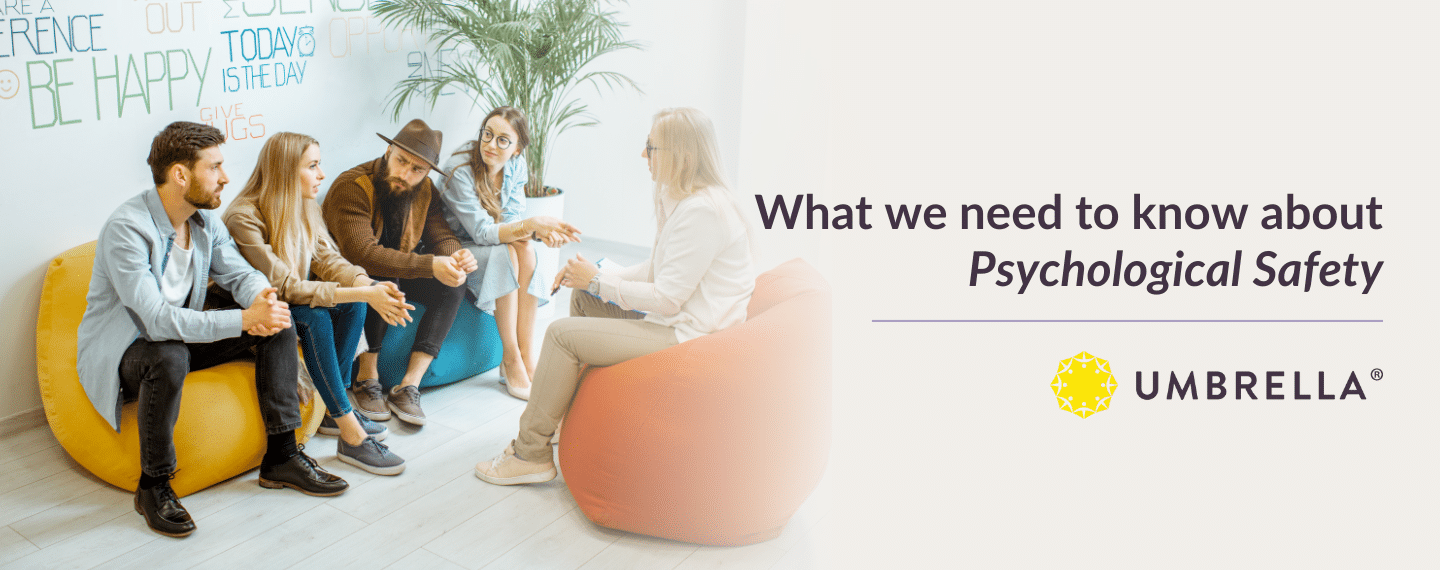What we need to know about psychological safety
Think of an instance you held back in a meeting, because you were unsure if your question was “smart” enough. Perhaps you chose not to give feedback, worried about “rocking the boat” too much. Or maybe you felt the need to hide parts of your identity just to fit in. If any of these statements resonate with you, you’re not alone. These moments often point to a lack of psychological safety in the workplace.
According to Umbrella’s Wellbeing Assessment report published in March 2024, between one in five and one in three employees report that their teams are lacking when it comes to psychological safety. Nearly half (44%) don’t agree that it is safe to take a risk in their team.
What is psychological safety?
Psychological safety is the ability to take interpersonal risks without fear of negative consequences. The concept originated in the 1960s within the field of change management but gained widespread recognition through the work of Amy Edmondson. Edmondson’s research, particularly Google’s Project Aristotle, demonstrated that “how a team works together is more critical than who is on the team”. This study identified psychological safety as the most important factor influencing team dynamics.
In practice, high psychological safety manifests as individuals feeling comfortable asking questions, confident in providing constructive feedback even when it challenges the majority view, approaching and challenging peers and leaders, admitting mistakes, sharing innovative ideas, and showing up authentically.
Why is psychological safety important?
Psychological safety forms the foundation of numerous positive workplace outcomes, including job satisfaction, engagement, teamwork, innovation, wellbeing, and performance. When psychological safety is high, individuals feel empowered to share ideas, admit mistakes, and collaborate openly. Without psychological safety, other workplace initiatives often become less effective, as employees need to feel secure to participate fully and contribute meaningfully.
Building psychological safety requires consistent effort and time. But, like trust, even one or two negative experiences can quickly undermine it. When psychological safety is low, employees may withdraw, disengage, or even “quietly quit”. A lack of psychological safety stifles innovation, elevates stress, damages team dynamics, increases turnover, and damages trust. Ultimately, fostering psychological safety is critical for unlocking the full potential of individuals, teams, and organisations.
How can we improve psychological safety?
Several factors influence psychological safety, including individual factors such as personality and past experiences, team-level factors like access to peer support and team norms, and organisational factors such as supportive HR strategies and organisational culture.
Among these, leaders – particularly immediate managers – play a pivotal role. Employees spend significant time with their leaders and look to them to model acceptable behaviour. While fostering psychological safety requires a holistic approach addressing all levels, improving leader competency is an excellent starting point.
Leaders must exemplify behaviours that promote psychological safety in everyday interactions by:
- encouraging open communication and diverse perspectives
- creating a safe environment for mistakes and learning
- demonstrating vulnerability and accountability
- recognising and celebrating contributions.
By focusing on leadership and embedding psychological safety into organisational culture, we can drive meaningful and sustainable outcomes across the workplace.
Research on psychological safety
Psychological safety has been a discussion topic since the 1990s and has recently gained significant academic and industrial attention, particularly in the context of enhancing positive employee experiences. However, research in the New Zealand context remains limited. As a result, much of the current understanding is drawn from studies conducted internationally, which, while valuable, do not fully capture the unique dynamics of New Zealand workplaces. To effectively improve psychological safety, we must explore it within our specific context through systematic research.
To address this gap, a team of researchers from Auckland University of Technology is conducting ongoing research on leadership and psychological safety, with a particular focus on ethnic diversity. The aim of this research is to explore how leaders’ behaviours influence key employee outcomes, such as engagement, turnover intention, sense of belonging, and wellbeing, via psychological safety. Specifically, the study seeks to understand whether leaders promote or hinder psychological safety and how this, in turn, impacts on employee outcomes. The findings will provide a foundation for further exploration into the crucial topic of psychological safety, which is essential in fostering collaboration and innovation within the workplace.
Additionally, these findings will inform leadership practice. As noted, leaders play a critical role in shaping employee psychological safety, and equipping leaders with strategies to enhance psychological safety will yield a wide range of benefits for teams and organisations overall. As we transition into a new year, psychological safety remains a critical objective to ensure that employees manage changing times effectively and that teams are well-led to maintain productivity, cohesion and innovation.
If you are interested in contributing to this research, please click on this link to complete a fully anonymous online survey(Note: this survey was active at the time of article publication and will remain open until 15 April 2025). The survey will take approximately 20 minutes and includes multiple-choice and sliding scale questions on your demographic identity, experiences with your manager, psychological safety, and other related outcomes. For more information, please contact the researcher at [email protected]
This article was guest-written by Hansini Gunasekara, doctoral researcher at Auckland University of Technology. Hansini is an experienced leadership consultant and organisational behaviour researcher. Connect with Hansini via LinkedIn.
Interested in training your people leaders or executive team on the core principles and practices of psychological safety? Umbrella can help. We deliver workshops up and down the country, facilitated by our team of experienced psychologists. Get in touch or visit our website to find out more: https://umbrella.org.nz/psychological-safety-workshop/



